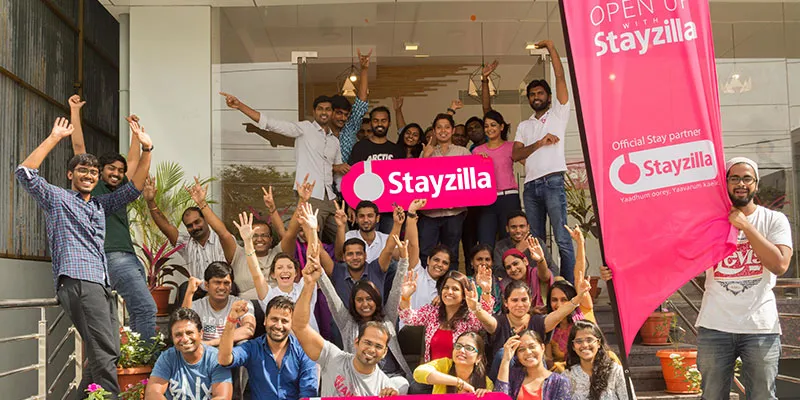The Stayzilla saga from a Silicon Valley lawyer’s perspective
Stakeholders of the startup ecosystem should come together not just in support of Yogi, but also to help the government by coming up with a sound policy paper to safeguard their interests in the future.
There is quite a lot going on in the Indian startup ecosystem. While the astronomical rise of financing, both in volume and valuations, is on par with that of Silicon Valley's, the recent incident of the arrest of Stayzilla’s Founder Yogendra Vasupal on questionable grounds, has raised considerable amount of heartburn in the founder community, and exposed the potholes in India’s road to becoming a startup superpower.

Ever since Yogi’s post — “Help! I need everybody!”— on Medium surfaced on March 14, 2017, I have followed the unfolding developments, analysed various Facebook posts and media reports on this issue. As a professional lawyer in Silicon Valley, having represented hundreds of startups on their legal issues, fundraising activities etc., along with the inevitable dissolutions and unwinding that come with some of them, here goes my two cents on the whole hullabaloo.
- The arrest: The police have no legal basis to arrest Yogi.
- First, the police don’t get to decide on the facts of any case- they just should not, and cannot, act as judge and jury, because that will create a very dangerous precedent for society, and violates the doctrine of separation of powers between the judiciary and executive parts of the government.
- This is not a criminal matter; therefore, even if the Bengaluru police are able to establish the 'fact' that the company has not paid its dues to Jigsaw, there is no legal basis for the police to arrest the founder. According to some reports, the police has not arrested him but merely detained him in prison. I do not understand how someone who is behind bars, and whose physical movement is restrained inside a prison cell is not deemed to 'be under arrest'. I am afraid this only exposes the deep-seated culture of couching everything in the sweetest of terms, instead of calling a spade a spade.
- Thirdly, there is a video of the landlord physically assaulting the two young founders. And the same police that was so eager to protect the rights of the poor vendor doesn’t seem to have any interest in protecting the young entrepreneurs from physical violence from the hands of a politically well-connected landlord.
- The speed with which the police acted in arresting Yogi does cast a doubt on their intentions. It is pertinent to recall a glaring example of police inaction in the city when more than a hundred women were molested in Bengaluru on New Year’s Eve. To my knowledge, not a single arrest has been made on the grounds that the police don’t have enough evidence to prosecute.
The complete disregard for the rule of law by the police, with seemingly no legal fallout for anyone involved, while Yogi continues to be in prison, is a demonstration of how far Indian laws and the society will have to go before we can provide a stable and predictable platform for a young business to thrive.
- The fallout: This one instance can have significant implications for the Indian startup ecosystem, that too at a sensitive time when the funding and exit opportunities seem to be drying up.
- If the founders of a well-funded and nationally well-regarded startup can be treated so harshly, put in jail on the complaint by a vendor, and physically abused and threatened so publicly with no implication to the culprit, then one can imagine the plight of the poorer entrepreneur with much lesser resources, recognition or network. This instance is likely to create a strong doubt in the minds of any new founders looking to start an enterprise in the hopes of growing the venture by outside financing and support from the ecosystem.
- The good news is that the founder community has come out in large numbers to support Yogi, and demand that he be immediately released, with #releaseYogi trending for a few days. However, while some of the industry stalwarts, like Sharad Sharma and Ravi Gururaj, have taken up Yogi’s cause publicly, the lack of response and public support from the other leaders of the startup ecosystem has been shockingly missing. All those founders of well-funded startups, the VCs and other stars of the startup world are missing from the public discourse on this issue. While all these celebrity founders can be seen sharing their gyan on all sorts of things at startup events or on social media, none of them seem to have any opinion, or seem to care about one of their peers being in prison for no apparent reason, other than his company’s failure to pay outstanding dues. They seem to feel that this is not their issue, forgetting that their companies, too, have raised outside funding, are part of the same fragile ecosystem, and Yogi’s case could have implications for them in the future if their startups start to falter. At this time, the Indian founders need to show their public support, and Yogi needs them to take action by bringing their celebrity status to good use in getting him out of prison.
- Blame the victim: I have followed with dismay and consternation how some people, including many founders and 'mentors', who have actually tried to blame Yogi for this situation and seem to be sympathising with the vendor’s actions. Here’s their rationale: 'Why did he not pay the vendor?' 'Why did he have to return the money to the investors?' 'Why did he write a letter promising to pay?' 'What could the vendor do when court cases to recover their dues can go on for years?' This just shows the lack of maturity and the urge for many in society to express their opinions, mostly as a form of debate, with no logic, forethought or understanding of the law, startup culture or business ethics. The fact that these opinions are being expressed by some of the acclaimed 'mentors', 'advisors' and founders running all sorts of accelerators, is cause for concern because it perpetuates this line of thinking to the rest of the founders who may be subject to their influence. To all those self-proclaimed experts, please note:
- Yogi did not do anything wrong. In fact, the company and its management seem to have taken a very thoughtful and mature decision by re-evaluating their direction instead of continuing to burn investor money in chasing the wrong business model. His offer to pay off the dues should be seen as an honest attempt at meeting the company’s commitments, instead of being used against him as some sort of admission of guilt that deserves prison time.
- The law supports Yogi. The doctrine of 'limited liability' is the bedrock on which modern corporations are formed. That concept is understood and applied in legal jurisdictions in every major part of the world, and it is due to the limited liability protection afforded to founders, shareholders and board members of a corporation that they are able to venture out and take risks in the pursuit of maximising value for all stakeholders involved with the venture.
- As far as the vendor is concerned, we should have zero sympathy for an entity that enters into a contract with a customer in the hopes of gaining large profits, and then using illegal and unethical means when business expectations don’t match the reality. The vendor cannot, on the one hand, claim that the contract is legally binding, and, on the other, discard its right to pursue its legal rights to enforce the contract in court. And, sending voodoo dolls with pictures of Yogi’s son is so bizarre that I would highly recommend a mental evaluation and counselling of anyone involved with that action.
Sure, the courts in India could take years to settle the payment dispute. But, this is a fact that should not have come as a surprise to a vendor operating in India. Yet, the vendor chose to rely on a legal contract while performing services instead of demanding payment upfront or asking for any other security. If the Rs 1.5-crore outstanding payment is so material to the vendor, then why did the vendor not manage its own financials in order to protect its own business, by either ceasing services earlier or demanding some kind of payment plan with the client? In the hopes of large profits, the vendor continued to provide its services to the company despite not having been paid for prior services. Extending credit to a customer is a very common practice in business, particularly if your client is a startup company; but, so is the risk that comes with providing services to a startup company without any down payments or security. One takes the risk in the early stages in the hopes of larger profits in the future. That is why not everyone can be a successful part of the startup ecosystem. To provide some context from Silicon Valley, the largest law firms in the US based out of New York are not able to work with startups because their billing system of getting paid for each minute is not supported by the startup model.Instead, smaller Silicon Valley-based outfits that believe in the startup model represent the Googles and the Facebooks. They may not get paid in some instances when their clients fold up, but the relationship is set such that the client comes back again to the same law firm and lawyer the next time, and it all evens out in the grand scheme of things.
- It’s a simple risk-and-reward analysis. You cannot have it both ways. You cannot sell your expertise to startups in Bengaluru, thereby implicitly promising flexibility, while at the same time, treating the same startup client like multinational companies of the world when things don’t go the way everybody had planned.
- The solution: So where do we go from here? A number of things have to line up to put the Indian startup founders at ease and put the ecosystem back on track.
- Yogi needs to be released forthwith. An FIR should be lodged against the landlord for assault, battery and criminal intimidation. In any event, other founders should take note of this landlord and be careful in doing business with him in the future. An inquiry should be held in the conduct of the police officers and the vendor, and they should be dealt with under the current legal provisions.
- Going forward, the entire culture relating to startups, and the views on roles and responsibilities of various constituents need to be overhauled. People who are involved in the community, like founders, angels, investors and service providers, need to be better trained in dealing with conflicts relating to startup businesses. There needs to be a greater focus on learning instead of only fundraising. Startup events that have proliferated in India in the last 3-4 years should dedicate a significant amount of time discussing substantive issues, like best practices, contract terms, legal rights, financial management, and less on funding and pitch events.
- Professionals like lawyers, accountants, and advisors need to undertake more active outreach programmes to educate the founders and others in the community. The founders, on their part, need to learn to appreciate the value of such circumstances and take a deeper dive into issues outside of technology and funding that also affect their potential rights and liabilities.
- Organisations like iSPIRT should work with lawyers, advisors, and founders in developing a policy paper for the Government of India in order to create laws and procedures that would specifically apply to startup companies.
A separate 'StartUp Act' should be set up to deal exclusively with legal issues relating to startups, from entity formations, funding, exchange controls, taxation, employment, foreign investments, mergers and acquisitions and dissolutions/winding down. Any startup below pre-defined threshold revenues — the recent POEM regulations exempting startups with revenues of Rs 50 crore or less can be used as a model — should get the benefit of these simpler laws, rules and regulations.
For example, such startups should be exempt from the bankruptcy laws, and be allowed to shut down operations upon board and shareholder resolutions. Similarly, these startups should be exempt from having to obtain audited financials every year until they get to a certain revenue size.
As long as there is no fraud on the part of the shareholders or management in embezzling the company funds, simpler laws should be created for dealing with financial disclosures and liabilities relating to starting a startup, raising money and, if needed, shutting down operations.
The concept of limited liability should be strengthened in such new Act and fully enforced on a reliable and consistent basis. There is a lot of good quality precedent available in Delaware laws, and how Delaware courts have resolved conflicts in the past. The new Act should look to implement the best of the breed provisions that support a thriving startup ecosystem. After all, a founder of a fledgling startup should not have to deal with the myriad of laws and procedures that were mainly created to deal with a business tycoon convicted of criminal wrongdoing and the risk of his absconding.
(Disclaimer: The views and opinions expressed in this article are those of the author and do not necessarily reflect the views of YourStory.)











